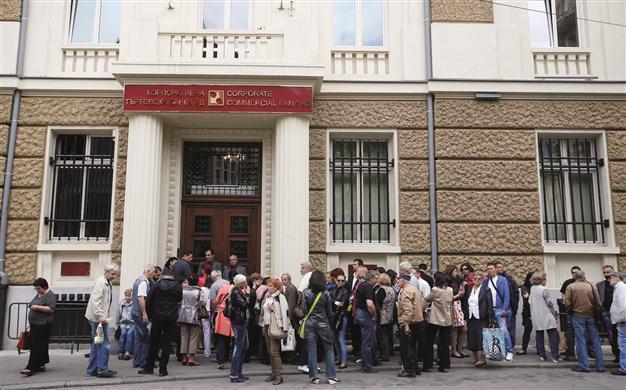Bulgaria's bank crisis eases after Europe okays credit line
SOFIA – Reuters

People queue outside the main office of Bulgaria's Corporate Commercial Bank in Sofia June 20, 2014. REUTERS Photo
Bulgaria's banking crisis eased on Monday with fewer depositors queueing to withdraw savings after leading politicians assured them that their cash was safe and the European Commission gave Sofia the green light to provide state aid to its lenders.
Bulgarians had flocked to branches of First Investment Bank on Friday and withdrew 800 million levs ($560 million) after a run had shut down another big lender. The central bank said criminals had tried to disrupt the financial system.
The authorities appealed for calm and arrested four people suspected of sending emails and mobile phone messages containing false information about the health of Bulgaria's banks.
Queues formed nevertheless outside branches of First Investment Bank, although they were smaller than Friday's, and by lunchtime they had disappeared in central Sofia.
Approval of Sofia's request to provide 3.3 billion levs ($2.3 billion) in state aid - a precautionary measure - helped shares in First Investment Bank rise 24 percent, reversing Friday's losses.
Echoing the International Monetary Fund, the EU executive also said the Bulgarian banking system was "well capitalised" - comments that also helped to soothe the situation.
"People have clearly calmed down, which was to be expected after all the statements," said Petar Ganev of the Sofia-based Institute for Market Economics.
"However, there are still risks of new attacks against the banking system as no doubt this was a well-prepared attack ... I hope people, including the politicians have learned from all this because it is essential to restore confidence," he said.
President Rosen Plevneliev urged Bulgarians to keep faith with the banks in a national appeal on Sunday after emergency talks with political party leaders and central bank officials.
"There is no cause or reason to give way to panic. There is no banking crisis, there is a crisis of trust and there is a criminal attack," Plevneliev told a news conference.
First Investment Bank declined to comment on how much money had been withdrawn on Monday but the bank has said it has sufficient funds to meet customers' demand.
Earlier, a woman in her 60s who gave her name only as Gergana invoked Bulgaria's last big financial crisis of 1996-7, which sparked hyperinflation and the collapse of 14 banks.
"I am here because I remember what happened nearly 20 years ago," she said.
Another customer, who gave his name only as Ivan, said he would move his savings to a foreign-owned bank.
About two thirds of Bulgaria's banks are now foreign-owned, in sharp contrast to the mid-1990s.
There were no queues of depositors outside other Bulgarian banks in central Sofia on Monday.
Last week the central bank took control of Bulgaria's fourth biggest lender, Corpbank, whose clients include many state companies, after depositors rattled by media reports of suspect deals involving the bank rushed to withdraw their savings.
The central bank and economists said Corpbank was a special case. Corpbank has denied any wrongdoing.
Snap election date The crisis has rattled Bulgaria's fractious political class, forcing them to bury differences at a time of great political uncertainty and on Friday they agreed Oct. 5 as the date for a snap election, promised after May's European elections.
Prime Minister Plamen Oresharski's minority cabinet, dogged by charges of graft and street protests since it took power barely a year ago, said it would soon resign after the main coalition partner, the Socialists, did badly in the EU vote.
Plevneliev said on Sunday he would dissolve parliament and appoint an interim government on Aug. 6, after Oresharski's resignation, to steer Bulgaria until the election.
Despite its political and economic woes, the IMF and economists have praised the stability of Bulgaria's banking system and its solid state finances.
It has one of the lowest public debt levels in the EU, at about 18 percent of national output, and the lev currency is tied to the euro via a currency board, backed by a broad national consensus as a bulwark of stability. It was introduced in the 1990s financial crisis.
Although the cost of insuring Bulgarian government debt rose last week, Sofia managed to launch a 1.5 billion euro bond sale last Thursday - a fact Finance Minister Petar Chobanov said showed "the stability of the banking and financial systems".
